Text
Comics and Memorabilia: Birthday Edition
My grandparents took me shopping for my birthday, which is coming up on April 27, and I got some excellent Flash-related birthday presents.

Like this lead statue of Captain Cold.
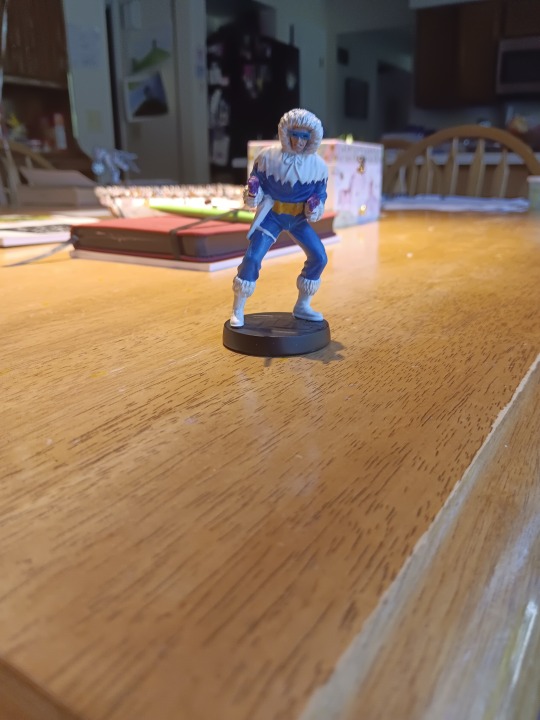
Here's the same statue out of its packaging. This Len will live with the rest of my Flash memorabilia.
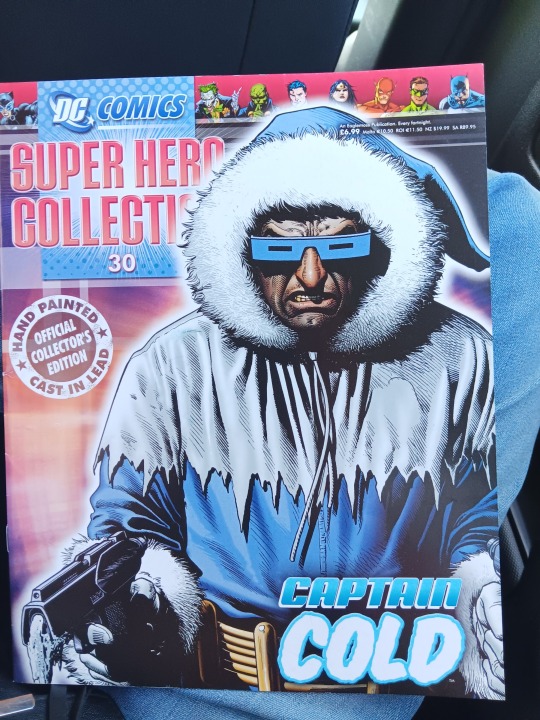
This book came with the statue, and did a really good job at summarizing Captain Cold's history, with surprisingly few errors.

I also got this issue where Weather Wizard fights Aquaman (from 1977).
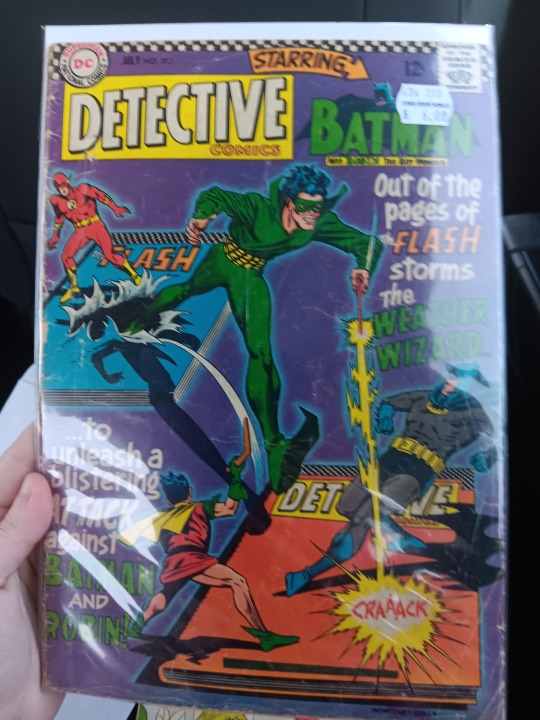
And I found the 1966 issue where Weather Wizard fights Batman and Robin! It's a little battered but I'm very excited to have it in color (before I only had the issue in a black-and-white Batman trade).
I also found Robin vol.4 #62-64 (featuring a team up between Riddler and Captain Boomerang Sr.), Robin vol. 4 #153 (featuring a team up between Tim Drake and Owen Mercer), Animal Man #8 (Evan McCulloch's first appearance) and Catwoman #70 (the middle part of the three-part story where James makes Catwoman's life more difficult).
And then there was the biggest surprise of today's comic hunt:

The Flash 80-Page Giant from 1964!
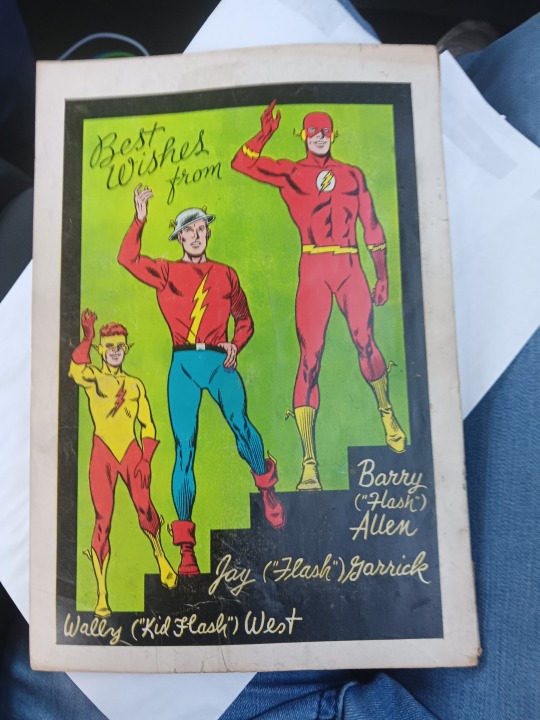
Here's the back cover, with Wally, Barry, and Jay.
But the real reason I was so excited to find this issue was this:

It's the Rogues' Yearbook Photo!
#flash comics#flash rogues#weather wizard#captain cold#captain boomerang#captain boomerang jr#owen mercer#george digger harknesss#the trickster#james jesse#catwoman#mirror master#evan mcculloch#animal man
20 notes
·
View notes
Text
Mark Mardon has to deal with Josh's teenaged rebellion.
This story is set in a nebulous future AU, and also features Star and Nathaniel Dillon, two adorable OCs of @gorogues.
#flash comics#flash rogues#mark mardon#baby josh#captain cold#mirror master#golden glider#the top#evan mcculloch#george digger harkness#weather wizard#heat wave#fanfic
12 notes
·
View notes
Text
youtube
Some thoughts:
While I certainly won't deny that Len has some anger issues, he doesn't really strike me as having the explosive rage you see in the Red Lantern Corps. That's more Lisa's thing. If anything, I think Captain Cold is a Green Lantern. He's stubborn to a fault, he's managed to keep a team of supervillains with widely disparate personalities together for at least a decade, and, when faced with an opponent who is far more powerful than he is (the Flash), he continually and insistently keeps fighting him, coming up with new strategies and plans to stay one step ahead of the Scarlet Speedster. He also faces down much more powerful villains regularly, and without much fear. All that takes serious willpower, and I think that that's ultimately a more prominent part of his character than his anger. Also, Len didn't originally create the Rogues. It was Sam who came up with that idea, and who was originally often the one calling the shots. Len sort of fell into the role later as a result of being the only remaining Rogue with his head screwed on straight.
I agree that Sam Scudder would be an orange lantern. He loves his money and his shiny, shiny mirrors, and he loves attention even more. Evan McCulloch, though...I honestly think he'd be a better fit for the Sinestro Corps. He's basically an Eldritch horror, and borderline unstoppable. Of all the Rogues, he's easily one of the creepiest. I do, however, agree that both he and Sam would be interesting in the Indigo Lantern Corps (particularly Evan, since he's had so much trauma and done so many messed up things). Also, I kind of hate the retconned backstory of Sam having killed someone in a botched burglary before he became the Mirror Master. In his original stories, he was arrested for robbery, and there wasn't any indication that he'd killed someone, and the retcon darkens all his fun Silver and Bronze Age appearances. I love Geoff Johns' Rogues, I really do, but he really needed to lay off on the grimdark retcons.
I agree that Grodd is either a red or a yellow lantern, though I would strongly lean towards the yellow end of the spectrum myself. Usually Grodd isn't especially angry. Brutal, yes. Angry, no.
Captain Boomerang being a red lantern does work, though honestly I would lean towards him being part of the avarice corps myself. Like Cold, while he does have a lot of unresolved anger issues, he doesn't really have that obvious burning rage that seems to characterize a lot of the Red Lantern Corps---and he is very greedy and gluttonous. I also agree that him being a part of the Indigo Tribe could be potentially interesting.
Weather Wizard as a Red Lantern makes sense, since he's frequently very prickly and was very revenge-motivated in his first couple of appearances, but he could be part of the Orange Lantern Corps as well. He's a thief, of course, but, more importantly, we know that he craves power and respect, and it seems very likely that on some level he envied his older brother, who was always his parents' favorite child. I also have to admit that an Ultraviolet Lantern would be a good way to learn more about him, since unfortunately he doesn't usually get as much characterization as the other Rogues do. I will also say that Mark's New 52-and-onward backstory (the only part of which I like is the fact that he and his family are from Guatemala) does make him lean more towards the Red Lantern Corps than he would have previously, since in that version his brother was killed by someone else whom he then took revenge upon.
Eobard being a Red Lantern does make total sense (especially since Barry is a Blue Lantern), but I could see him fitting into the Orange Lantern and Yellow Lantern Corps equally well. As the video mentions, he wants to have Barry's life, which would mean he could slot in quite well to the Orange Lantern Corps, and, of course, as a time-traveling murderous stalker, there's no doubt that he's scary.
Killer Frost is NOT a Flash villain! ARGH! I do agree with the Lanterns assigned to her, at least if we're assuming this is the Caitlin Snow version of her (the Crystal Frost version would have been a more malevolent/stalkerish Star Sapphire or Orange Lantern, and the Louise Lincoln version would have been a Red Lantern).
I mostly disagree on Heat Wave. While the New 52 Hothead McAngryman version of Mick would indeed be either a Red Lantern or a Yellow Lantern, I'm inclined to think that classic Mick part of the Star Sapphire Corps. Not only does that group need some men in it, but, more importantly, Mick is traditionally incredible devoted to and supportive of the people he sees as his friends. You know, I think I now know why the person making this video doesn't like Heat Wave. It's because he's only familiar with the most terrible version of him.
The three rings the person making the video gives to the Pied Piper work pretty perfectly for him. We know that he was lashing out against society and his cold, controlling parents when he was a villain, so a Red Lantern ring does make sense for him as a villain, he did, of course, reform, and he probably does inspire a lot of hope as a hero and social activist. That being said, I think he could simply stay as part of the Indigo Tribe from his reform onwards, as he is extremely compassionate. And hey, he knew about Piper's stint in Breedmore! And...didn't know that William Magnus was paid to give Hartley the hearing aids that allowed him to hear. Piper didn't build those himself.
I definitely disagree that Trickster belongs in the Orange Lantern Corps. James is many things, but one thing he is not is greedy. Back in the Silver Age, he explicitly said that he didn't care nearly as much about money as he did about messing with the Flash, and he's much more interested in showing off and in outsmarting people than he is in simple financial gain. I'd put him in either the Green Lantern Corps or the Blue Lantern Corps myself. He's a persistent little imp, and he certainly holds out a lot of hope for his own future, being as he is generally cheerful and optimistic. Axel would probably be a Green Lantern (due to his teenaged stubbornness and general recklessness), although the very early Axel who was a total sociopath might have fit into the Yellow Lantern Corps. Either way, neither one would be an Orange Lantern.
The Top is either a Green Lantern or a Yellow Lantern. While I don't deny that he hates the Flash and isn't very fond of society generally, his anger is fair outstripped by his willpower and just how scary he is. This is a man who taught himself everything he could about tops and engineering, who taught himself how to spin at super speed, who tried to take over the world, the country, and the city on separate occasions, and who repeatedly dug his way out of the grave several different times through his own sheer willpower. If that doesn't qualify him for a Green Lantern ring, I don't know what does. And, of course, the fact that he's a power-hungry, bomb-building ghost that possesses corpses makes him very scary, so he would also be a natural fit for the Yellow Lantern Corps. But hey, props for acknowledging the fact that Roscoe is mentally ill, and that that does affect his behavior. I can't say that the ultraviolet corps would be bad for him per se, just that I think Yellow or Green would fit him better. Especially since they're already the colors of his costume.
The Orange and Yellow Lanterns would both work well for Savitar.
Characters who weren't mentioned in the video, but who I will classify anyway:
-Zoom (Hunter Zolomon) would probably be either a Red Lantern (because of his anger at Wally for refusing to help him) or a Yellow Lantern (due to his sheer power and willingness to kill). Before he became Zoom, he would probably have qualified for a Green Lantern simply because of all the terrible things he managed to survive.
-Golden Glider is 100% a Red Lantern, being almost entirely motivated by the desire to seek revenge for Roscoe's death. Prior to his death, she would have been either a Green Lantern (because of her incredible determination, bravery, and ability to overcome her abusive father) or a Star Sapphire (because of her deep love for Roscoe).
-Albert Desmond is a Blue Lantern, always hoping that he'll be able to live a normal life with his wife, Rita (who also qualifies for a Blue Lantern ring). Mr. Element is an Orange Lantern; he was primarily driven by a desire for profit. Dr. Alchemy is a Yellow Lantern, as he was disturbingly detached from his humanity, and possessed of almost unlimited control over the elements.
-Alvin Desmond would either be an Orange Lantern (he's a lot like Digger in many ways, but much more power-hungry) or a Yellow Lantern (for the same reasons as Albert when he's Dr. Alchemy).
18 notes
·
View notes
Note
I'd second Johns. I love Bates' work on the Rogues, but he's almost as old as my grandparents and might not be up for writing comics about the characters, especially after almost forty years.
I think Cary Bates is at the top of the list of comic creators I want to meet at a comic book convention and get an autograph from, although really I'd love to meet any Flash creators.
Based on the Comic Writers who are still around and able. Who is the best Rogues writer?
I'd give the title to Geoff Johns, though his work can certainly be an acquired taste that not everyone loves. He gets the nod because he's still fairly active in comics and is probably the creator who loves them most and has given them the most focus/attention. People can love or hate his work, but he revitalized them and is likely responsible for much of their modern fanbase; to be honest, they'd been falling into obscurity and obsolescence and weren't getting much love from DC or its writers. His work got people enthused for them, especially Cold, and I'm not sure modern readers realize just how much of a joke Len was generally considered to be prior to Johns' run. His work had such a major impact for them.
(This isn't to dismiss the Rogues' portrayals prior to Johns because they had some excellent stories, just saying the Rogues generally hadn't had a great reputation amongst readers since roughly the 1980s. And most of them didn't get much development between Crisis and Johns' arrival on the book.)
Arguably William Messner-Loebs may count as well, because he wrote a Flash issue a little over a decade ago, but I think he's mostly retired from comics (he's 75 now). Cary Bates also wrote a Flash issue at the same time as Messner-Loebs, but is also probably retired now too (he's 76, though he did an interview with Mark Millar a few months ago and is clearly still very mentally sharp). Grant Morrison writes an amazing Evan McCulloch but hasn't done much with most of the Rogues, so I think they aren't really in the running for this title even though they're a fantastic writer.
9 notes
·
View notes
Text
I haven't read this yet (I'll be getting my copy tomorrow), but I feel like Evan almost always needs Len (or someone) to slap him upside the head. This is just the latest example.
Evan is kind of a human disaster. Although weirdly, he seemed pretty controlled when Morrison wrote him, so I have no idea why every subsequent writer is so insistent on making Evan so unhinged.
In-universe we can probably chalk a lot of it up to all that cocaine, I guess....
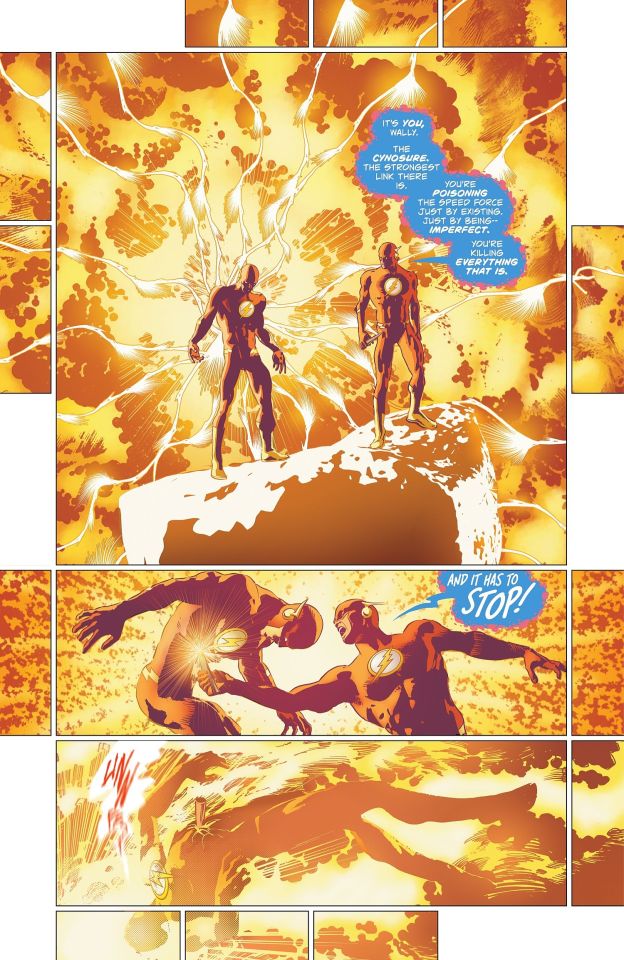
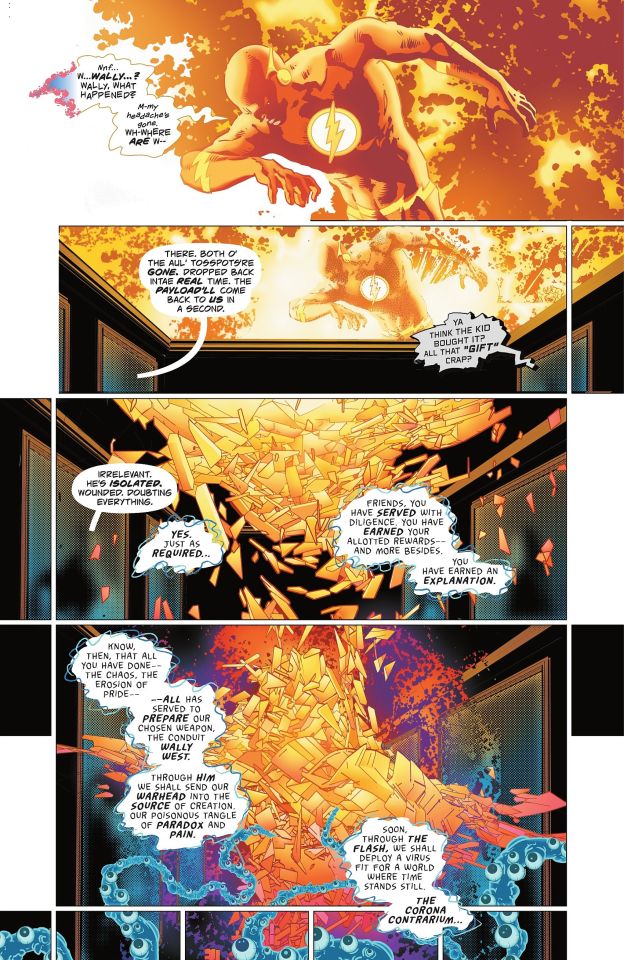

Spoilers for Flash #6!
I don't know what to think of this "Crown of Thawnes". Is Eobard back, or is this another Thawne? (or perhaps someone entirely different?) Maybe it's even an amalgam of Thawnes throughout history, hence "Thawnes" plural and all the weird figures around them. Whoever it is, they infected/possessed Barry to plant doubt and confusion in Wally, as well as stab him with that d-brane spike. And, as the tentacled eyeball monstrosity says, it plans to use Wally to deliver the virus to infect the world. The monstrosity's minions are Evan, Grodd, the Folded Man, and the mysterious piper of unknown origins. It seems clear after the Beast World tie-in that this isn't Hartley unless he's being controlled at specific intervals, because he was his usual self in that issue and it was even written by Si Spurrier rather than a fill-in writer who may not have been aware of Spurrier's ongoing plot. So who knows who the piper is.
It seems like Evan needs Len or somebody to slap him upside the head for participating in all this, but I guess we don't know how voluntary his participation is. It does seem that the tentacled eyeball monstrosity rescued him from dire straits, possibly related to the DC universe getting rebooted and altered, so he probably does owe it something. Still, it's disappointing to see him party to stuff like this, not to mention him nearly killing Irey a couple of issues ago.
I don't think Spurrier's stint on this book has been bad, but it's definitely been tiring due to its ongoing grimness and the painfully real depiction of depression which afflicts several of the characters. It's particularly jarring whiplash after Jeremy Adams' mostly-sunny run, and I felt like I had the wind knocked out of me upon seeing the preview pages last week during the midst of my own depressive episode. I applaud Spurrier for the realistic portrayal of depression -- he presumably has first-hand experience -- but man, I don't really want to read it in Flash comics, especially on a bad day. Could just be me, though.
17 notes
·
View notes
Text
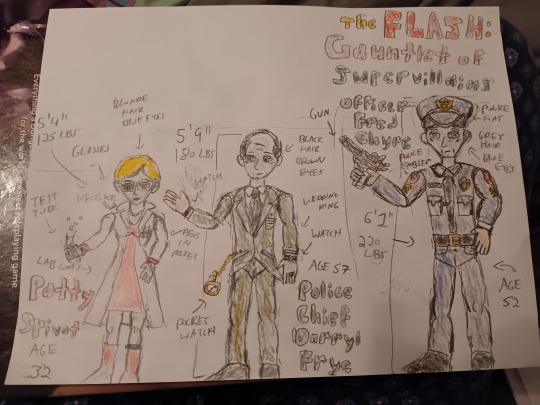

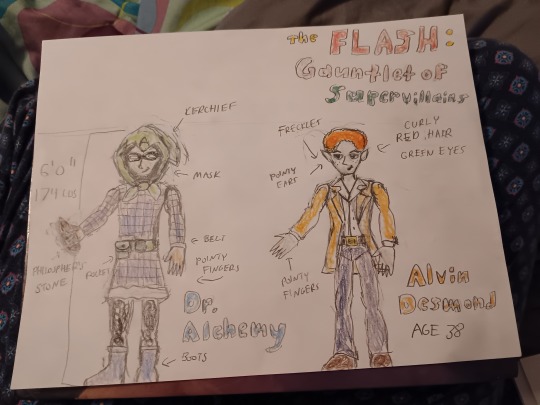
And one last round of concept art for the Flash game.
The first picture includes Barry's fellow police scientist Patty Spivot, Barry's punctuality-obsessed boss Darryl Frye, and Officer Fred Chyre.
The second picture is of Albert Desmond, his wife Rita, and Mr. Element (one of Albert's costumed alter egos).
The final picture is of one of the many, many hardships of Albert's life: his evil "psychic twin", Alvin Desmond, who runs around as Dr. Alchemy and likes to frame Albert for his crimes. His exceptionally pointy ears and fingers are due to the fact that Alvin isn't human, but rather a simulacrum created by the Philosopher's Stone.
#flash comics#flash rogues#darryl frye#fred chyre#patty spivot#albert desmond#alvin desmond#dr. alchemy#mr. element#rita desmond#my fanart
7 notes
·
View notes
Text

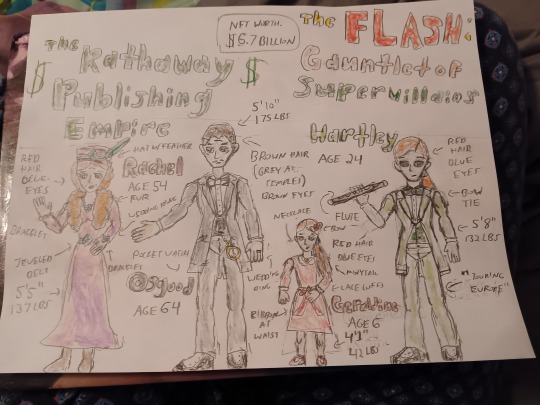
More concept art for the Barry Allen Flash video game.
The pair in the top photo are Dexter Myles, the curator of the Flash Museum, and Marcy Dunphy, a young reporter who stumbled upon the connection between the very wealthy Rathaway family and the Pied Piper in Flash vol. 1 #307.
The bottom drawing is the Rathaway family: Rachel and Osgood Rathaway, the heads of the Rathaway publishing empire, and their children, Hartley and Geraldine. The Rathaways' official story about Hartley is that he's "touring Europe", because obviously they aren't going to admit that he's the Pied Piper.
#flash comics#flash rogues#dexter myles#rachel and osgood rathaway#jerrie rathaway#hartley rathaway#pied piper#my fanart
9 notes
·
View notes
Text


I made game maps for my hypothetical Barry Allen and Wally West video games.
Barry's game primarily takes place in Central City, while Wally's game mostly takes place in Keystone.
Central City's map is based heavily on the one found in the DC RPG books of the late 1980s, but with some modification.
10 notes
·
View notes
Text
Captain Cold and the Blizzard Battle: The Kid's Book of Never-Ending Cold Puns
I was looking through some of the older posts on @gorogues's blog, and I was reminded that there was a kid's book that featured Captain Cold and the Top called Captain Cold and the Blizzard Battle. Since it was selling for six bucks on Amazon, I bought a copy, and I am now going to share my thoughts on it with everyone:
Captain Cold's stats (6'2", 196 lbs, brown hair, brown eyes) are taken directly from all those DC guidebooks.
The puns begin almost immediately. Len terrorized Central City with "cold-hearted crimes", the Flash "put him on ice", he has "nerves of ice", and "his cold heart lets him remain calm and collected even when the heat is on". The book also identifies the yellow capsule-looking things on his belt as cold grenades, though I don't think that those are what they actually are.
Captain Cold makes an entire blizzard just to rob an armored car. Seems a bit excessive. He also does it in May, because of course he does.
The blizzard also gets some kids out of school early, much to the kids' delight.
LOL, Len looks so proud of himself as he walks away with his loot.
Icicle (who is also in Central City, and is showing up Len), is stealing some "cold hard cash". Because cold puns!
Len gets away with his loot, since the Flash is more interested in stopping the Icicle (who's trying to get away with a hundred times as much money as Len) than he is in stopping Len. However, because Icicle is threatening his position as the best cold-themed criminal, Len can't even feel happy about his success.
Apparently Captain Cold's hideout is in an indoor tanning salon/steam sauna. He bought it with stolen money just so he could shut it down, because he just hates tanning salons/saunas that much. (I imagine that Mick was disappointed when he learned about that.) The fact that it's an excellent hiding spot for him is just a bonus.
And then Roscoe shows up! He's Len's pal in this story (which is hilarious, since they usually hate each other), and, even though Len invited him over, he still freaks out when Roscoe shows up (allegedly because he might have been the Flash).
"Aww, even you aren't cold enough to freeze a friend." And then Roscoe is instantly proven wrong when Len freezes his nose for no reason.
Roscoe has had "so many run-ins with the law today that my head is spinning".
Anyway, Len is bitter about the fact that Icicle seems to be better at his own game than he is, and tells Roscoe that he's lucky to be the only "spins-around-fast villain in the world."
Roscoe: "Thanks! But don't sell yourself short! What would we do without a guy like you?" Cheerful friendly Roscoe is both endearing and weird.
Len: "You'd call the Icicle. Or Mr. Freeze. Or any one of the other villains who have cold powers. Nowadays, it seems like there are dozens of them!" Len has a point. DC is full of ice-themed villains.
We then learn that, while Len got away with $10,000, the Icicle managed to get away with a million dollars (meaning that he also beat the Flash), and that at some point in the past, Len froze the Eiffel Tower. Why? Who knows!
Unfortunately, the Top then points out that Icicle froze all of Germany at the same time Len was freezing the Eiffel Tower, which I guess makes this version of Icicle the most powerful version ever.
Roscoe: "I hate to say it, but I know when a guy's been topped!" All these horrible puns make me smile.
Len wants to put the Icicle in his place for showing him up all the time, and, after Roscoe starts sneezing, he gets the idea to spread the common cold to the entire city. No, really. His evil plan is to spread the common cold to the entire city, and then rob some banks while everyone is too busy being sick to stop him.
In order to do this, he alters his cold gun so it can lower the temperature by about 20 degrees (instead of its usual, much lower temperatures), breaks into Bosh Labs to steal an experimental hypothermic rhinovirus (rhinovirus is the scientific name for the common cold, which I surprisingly actually did not know!), releases the virus into the air, and then makes the weather chilly so that the virus will spread really fast and get everybody sick.
Len won't be affected by the virus, however, because he also took the antidote from the labs (and also drank some orange juice, just in case.)
"He was about to conquer the entire city with a super-powerful cold! That had to be the greatest "cold crime" in history!" PUNS!
The plan works immediately, and everybody gets sick....but when Len goes to rob a bank, he learns that the Icicle has taken the credit for releasing the virus on live TV, and predictably gets angry.
"After all the years he had spent stealing from Central City, Captain Cold finally knew what it felt like to be robbed." This line is amazing and I love it.
Captain Cold goes to a coffee shop to get his favorite drink, iced coffee. Unfortunately for him, there's a very long line of people (all of whom are ordering tea, apparently), so he uses his cold gun to cut to the front of the line in a manner reminiscent of Gru in the Despicable Me movies.
The clerk gives Len regular coffee, so he freezes the poor clerk too and ices the drink himself...only to see the Flash fighting the Icicle through the window. And because of the cold Len gave him the Flash is losing!
Len goes back to his hideout, and Roscoe promptly shows up two seconds later, noting that it looks like the Icicle is going to "put the Flash on ice----permanently!"
For some reason, Roscoe always spins inside Len's hideout instead of just walking inside like a normal person. Which actually makes sense for Roscoe.
Roscoe has come down with the cold alongside everyone else in Central City. He thinks that the Icicle is responsible until he notices that Len isn't sneezing, at which point Len explains that he was the one who created the virus, and thus knew to take the antidote. Icicle wasn't affected because his entire body is made of ice, and thus can't catch a cold.
Len also reiterates that his cold gun can't affect Icicle...right before informing the Top that he's planning to go help Flash fight the Icicle anyway.
Roscoe's reaction: "That would mean saving your worst enemy---and mine! If you could, that is. No offense, but you said it yourself. You're just a guy with a cold gun. The icicle is made of ice. Your cold blasts can't hurt him, but..."
Len: "The Icicle can hurt me."
"The Top nodded, and then sneezed. "That doesn't sound like a fight you can win." " Len and Roscoe hanging out together is the best part of this book.
Len, being Len, is determined to fight Icicle anyway, and goes out to do just that. He saves the Flash from the Icicle, which prompts the Icicle to realize that Len's probably mad about him taking the credit for his crimes. The Icicle kind-of sort-of apologizes before telling Len to get out of his way so that "the better cold villain" can "finish off the Flash".
Shockingly, Len doesn't react well to this, and tells Icicle that if he wants the Flash, he'll have to go through Len first. Icicle replies with a title drop: "You just made a big mistake....You and I do the same thing. Only I do it better! But if you want a blizzard battle---you've got it!"
The two start fighting, and, while they're pretty evenly matched in terms of output, Len has a massive problem: as was underscored earlier, he doesn't have any real defense against Icicle's powers.
As the fight starts to turn against him, Len runs away and heads for his hideout. Icicle follows him, boasting about how dumb Len was to lead him to his hideout...and then Len promptly turns on all the saunas and indoor tanning beds, increasing the temperature in the room along with them.
This drains Icicle's powers, and Len promptly kicks the crap out of the powerless Icicle. "It takes more than ice powers to make a man cold. I always knew I was colder than you!" Oh, Len.
After he's sure he's defeated the Icicle, Len makes some more puns. "They say revenge is a dish best served cold....But it also tastes pretty good hot!"
Then the Flash shows up, immediately disarms Len, and knocks him to the ground with one super-speed punch. He's still suffering from the effects of the cold, but the fight between Icicle and Len gave him enough time to recover from his fight with Icicle.
Flash: "I just don't understand supervillains. It was so easy to follow the icy path of destruction that led here. So now I know where your hideout is, which means it isn't good for anything anymore. And with the Icicle out cold and your gun out of your hands, I won't have any problem taking you to jail...Was all of that really worth it? Just so everyone would know you were the one who unleashed this sickness on the city?"
In Len's mind, of course, it was totally worth it. Now that the Flash knows he unleashed the virus, everyone will know "that Captain Cold was the villain responsible for the greatest cold crime ever committed in the city!" So...happy end for Len, I guess.
No mention of what happened to Roscoe. Maybe he decided to go on a date with Lisa.
Anyway, this story was delightful and I loved it to bits. Having a story narrated entirely by Len was great, and I enjoyed that he felt in-character throughout. I could totally see Silver Age comic Len pulling a scheme like this, and Cold's strategic cleverness and grouchy possessiveness of Central City seems to come straight from Johns' Len. I also loved how hilariously petty he was throughout the story, from using his cold gun to cut in line for coffee to saving the Flash from Icicle just so he could prove that he was the better criminal.
The never-ending puns were likewise great, and I enjoyed that Roscoe got to be an important character in the book. Even though the role of Len's cheerful but slightly dimwitted pal would have worked better for Mick than for him, there's something extremely funny about having Roscoe in that role given how much he and Len hate each other in the main comics. And hey, he's still an endearing dork who makes top puns, so there are still some aspects of him that are recognizably Roscoe.
Finally, I enjoyed the art and the characters' slightly goofy facial expressions. I will probably do a separate post of the art at some point so that everyone else can enjoy it.
This is a great little book, and it was definitely worth the six dollars I paid for it.
#flash rogues#flash comics#captain cold#the top#the flash#the ridiculous things I buy as part of my Flash collection#book review
15 notes
·
View notes
Text
The Retcon I'm Glad Hasn't Happened Yet
So, on TV Tropes, I found the following description of Len and Lisa:
"Captain Cold and Golden Glider. Jerks as they are, they were horribly abused by their father, who's cruel treatment of them left Leonard so emotionally broken he developed a cold and unemotive exterior that contributes to his "cold" image. Lisa, though more openly emotional, is still clearly affected by it herself and became a bitter, angry and violent person, not helped by the fact she also lost her boyfriend, The Top, who despite being an asshole had been able to make Lisa so hopelessly in love with him that she blamed Barry for his death and swore to hurt him as much as she could."
Most of this is accurate, with the exception of the part I bolded.
Doesn't the way that this is written make it sound like it was Roscoe's fault Lisa became a villain, and that she was the only half of the relationship to feel genuine love? I mean, Roscoe is undoubtedly a massive, massive jerk, but----and this is a BIG but-----he was not a jerk towards Lisa. Ever. There's nothing in any of Lisa and Roscoe's Bronze Age appearances that suggests that he was manipulating her in this way. Indeed, in Flash vol. 1 #297-303 (the Roscoe ghost story), we got to see them interact with one another quite a bit, and, in spite of the fact that both of them are generally dysfunctional and nasty people....their relationship itself was neither nasty nor dysfunctional. They work as an equal team, and if there's any manipulation, I don't see it. Roscoe isn't jealous of Lisa's flirtatiousness (no insecurity when she talks about how great Barry Allen is at kissing or about how hot he is), Lisa doesn't get frustrated with Roscoe's boasting, they compliment each other constantly, they work well together, and they protect each other to the best of their abilities.
It's also worth noting that, for the entire time Roscoe was alive, Lisa was not a criminal, and, since her debut comic (Flash #150) seemed to indicate that the two of them had been dating for at least a couple of years, that strongly suggests that Roscoe had no desire to lead her into a life of crime. Especially since he also served as her figure-skating coach, meaning that he was actively helping her advance in her career. That would make no sense if their relationship was a ploy to make her a supervillain or something. I seriously, seriously doubt that Roscoe decided to "make Lisa fall in love with him" just on the off chance that he might maybe die fighting the Flash, prompting her to become a supervillain to get revenge. If you want to manipulate someone into being a supervillain for whatever reason, there are much easier ways of doing it than having to actually drop dead before it happens. It's not like Roscoe knew he would be able to come back as a ghost. What, are we supposed to assume he did all this, up to and including his own death, just to spite Len or something? Even Eobard Thawne isn't that petty!
What's more, even Geoff Johns, who didn't like Roscoe and strongly downplayed the relationship Lisa had with him, never suggested that Roscoe was manipulating her....which is particularly significant since Captain Cold is the one narrating most of the scenes about Lisa (since she was dead at the time).
In his spotlight issue, he off-handedly mentions that Lisa became a Rogue after the death of her boyfriend the Top, with no indication that Roscoe was manipulating her into loving him or into becoming a criminal. If anything, Len puts more blame on himself for her becoming a criminal, since from his perspective (and, frustratingly, Johns' apparent perspective) she primarily became a Rogue to be with her older brother.
Later during the run, when a very, very mentally ill Roscoe popped up in the Rogues' hideout and brought up his relationship with Lisa as a reason that Len should allow him to stay:
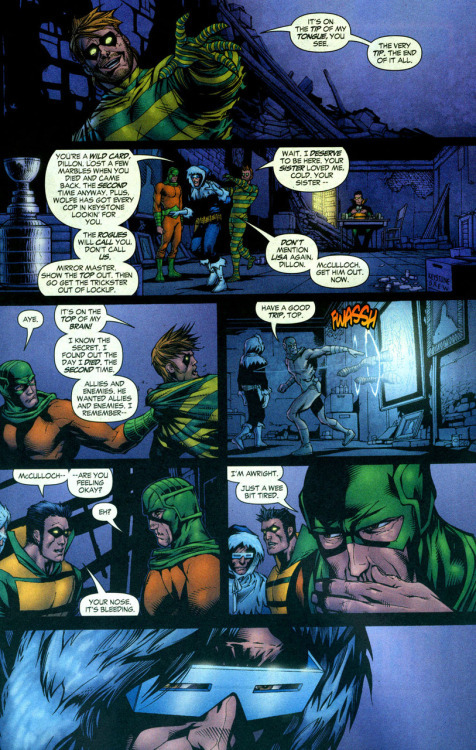
"Your sister loved me, Cold. Your sister---"
Len tells him to not mention Lisa again (Len gets grouchy when people bring up his dead sister), but it's worth noting what he doesn't say here. He doesn't say "No, she didn't. You just made her think she did." or "Only because you manipulated her." or anything like that. If Roscoe HAD been manipulating her, I'm pretty sure Johns would have had Cold bring it up here, since Johns dislikes Roscoe out-of-universe and Len hates Roscoe in-universe. He's not going to be sugar-coating their relationship!
But anyway, now I'm really afraid that somebody at DC will bring Lisa and Roscoe's relationship back, but that they'll retcon/change it so that it's more in line with the apparent interpretation I bolded above; that they'll have the relationship be abusive on Roscoe's end. He's used as a plot device boogeyman all the time anyway, so I could totally see someone deciding to have him be responsible for Lisa's becoming a criminal (in the sense of him manipulating her against her own judgement, I mean, not in the sense of "he's dead and I must avenge him"). And because most modern comic fans only know Roscoe from Johns' run (in fact, I would bet that that's where the above posted interpretation of their relationship came from), I could easily see someone deciding that it would be a great way to reintroduce their relationship. I really, really hope they don't, though.
Now that I'm thinking about it, I'm actually kind of surprised that Johns didn't make a retcon like that during his run, because it would fit with how he generally used Roscoe, and would have served as another reason for Len to hate Roscoe. I'm very glad he didn't, though.
13 notes
·
View notes
Text
My Thoughts On Each Long-Term Writer of the Flash, Part 1
Over the years, the Flash comics have been written by a huge number of writers, with their own strengths and weaknesses. In this post, I am going to give a rundown of all the major Flash writers and talk about the high points and the low points of their runs. In order to qualify as a major Flash writer, the writer has to have written at least four or five issues of the Flash (so fill-in writers don't count).
Keep in mind that much of this is subjective and based solely on my personal opinions. Also keep in mind that I will be harder on the more recent writers than the Gold/Silver/Bronze Age writers, since the older writers were writing during a time when there was much less editing and continuity than there is today. As such, I don't expect as much from their stories as I do from more modern writers.
I'll begin with the original writer for the Golden Age Flash, Gardner Fox, and move forward chronologically from there.
Gardner Fox
Positives
First, and most obviously, Gardner Fox was responsible for creating the Thinker, the Shade, the Ragdoll, the Rival, Jay Garrick, Joan Garrick, and the Flash identity itself. Without Gardner Fox (and artists Harry Lampert and E.E. Hibbard), there's no Flash. This pretty much makes him Flash's most important writer by default.
Introducing the Multiverse. When Gardner Fox started writing the Silver Age Flash, one of the first things he did was introduce the new Flash, Barry Allen, to the original Flash, Jay Garrick. He did this, of course, by establishing the concept of the multiverse. Earth-1 and Earth-2 existed in the same place in space, but vibrated on different frequencies, and each world had its own Flash. It was a brilliantly ridiculous sci-fi way to have both Flashes coexist, and it enabled Jay Garrick, and the rest of the JSA, to return to the DCU.
Writing female characters. For a Golden/Silver Age comic book writer, Gardner Fox generally handled female characters really well. Notably, during his run on the Golden Age Flash, he had Joan Garrick in on Jay's secret from the start, and he was also the writer responsible for ensuring that Barry Allen would, in turn, tell his wife Iris about his secret identity (by having Jay and Joan come visit Barry and tell him to stop keeping important secrets from his wife). He's also Iris' best Silver Age writer, insofar as he made her the most supportive and least nasty. So thank you, Gardner Fox, for being better at writing female characters than most of your contemporaries. (If you want to see the worst example of female characters in the Silver Age, check out Robert Kanigher's Wonder Woman. It's something else.)
Utilizing humor. This was especially noticeable during the Golden Age, where the Flash's adventures often resembled slapstick comedies, but Gardner Fox was also good at using lighthearted humor in the Silver Age (as highlighted by his particular affinity for the Trickster, whom he wrote four separate stories for).
Writing plots. Golden and Silver Age comics have a somewhat justified reputation for being wild, random, slapdash affairs, but, in spite of their light-hearted humor, Fox was actually good at writing solid plots. "The Flash of Two Worlds" is an all-time classic, and I've never read any story of his where it didn't feel like he was putting in effort to create an entertaining, internally consistent story.
Negatives
Honestly, besides being bound by the comic conventions of his time, Gardner Fox doesn't really have any noticeable weaknesses as a writer. The only thing I can think of that isn't something that basically applies to all Golden/Silver Age comic writers is the fact that he might have been a little too reliant on slapstick humor sometimes. That's how we got "The Real Origin of the Flash" (the story that attempted to give the Flash his own Mr. Mxyzptlk style character, but failed miserably) and some of the more tiresome Three Dimwits plots. But still, all in all, Fox did a really solid job on the title.
Robert Kanigher
Positives
Kanigher wrote Barry Allen's origin story, and created him, Iris, and I guess the Turtle Man (not the Turtle---he was created by Gardner Fox) as well. The lightning bot/chemicals origin is absolutely iconic, and may in fact be the best superhero story Kanigher ever wrote.
Before that, during the Golden Age, Kanigher also created Jay Garrick's foe the Fiddler.
Kanigher is....well...he's definitely got some original ideas. Totally nuts ideas, but original ones nevertheless. If you want the perfect example of Silver Age insanity, Kanigher is your man.
During the early Bronze Age, he managed to put out some well-meaning, if very awkward, stories that addressed social issues. They haven't aged well, but at least he tried. And to be fair, his female character do get slightly better in this time period as well.
Negatives
His female characters are painful to read. It's not as though this was something unique to him, but even by the standards of other Golden and Silver Age writers, he was pretty bad. Again, see his run on Wonder Woman for proof. More specifically as far as the Flash is concerned, he's the one who got the ball rolling on Mean Silver Age Iris.
With the exception of the origin story, where he seemed to catch lightning in a bottle, all of his Silver Age Flash storylines fall into one of two categories---they're either boring and generic, or they are completely bonkers, off-the-wall insane. Silver Age Flash is actually one of the more restrained Silver Age comics, so Kanigher's off-the-wall stories stick out like a sore thumb. For the best example of this, check out the first story in Flash #161, "The Case of the Curious Costume". And then, to maintain what's left of your sanity, check out the much better second story in the same issue, Gardner Fox's "The Mirror With 20/20 Vision". (I bet you can't guess who the villain in that story is.)
"Iris Allen is FROM THE FUTURE!!!!" Admittedly, there are several stories that came out of this reveal that I do like....but this revelation would end up tying the Flash Family tree in knots later on down the line. And it's also just an insane revelation in general, especially for the early Bronze Age.
John Broome
Positives
95% of the Flash's main villains. Captain Cold? Mr. Element/Dr. Alchemy? Mirror Master? Gorilla Grodd? Pied Piper? Weather Wizard? The Trickster? Captain Boomerang? The Top? Abra Kadabra? Professor Zoom the Reverse-Flash? Heat Wave? All of them were created by John Broome (alongside artist Carmine Infantino). All of them. And all between 1957 and 1963!
The Rogues. John Broome was also the first writer to have more than two of the Flash villains team up into an organized group. (Gardner Fox had had Captain Cold and Trickster team up in an earlier story, but Broome was the first writer to bring together the team that would eventually become the Rogues we know today). He was also the man who created the Rogues' tailor, Paul Gambi.
Developing Barry's supporting cast. Broome introduced Wally West as Kid Flash (and wrote his hilariously lackluster origin), his parents, Nora and Henry Allen, his childhood sweetheart and current movie star, Daphne Dean, Iris' absent-minded father, Ira West, and Dexter Myles, the ex-Shakespearean actor who would become the curator of the Flash Museum. He also introduced Ralph "The Elongated Man" Dibney and Ralph's wife Sue, who would go on to to get their own stories but who would remain long-time friends with Barry and Iris, and Rita, another friend of the couple's, who would marry a reformed Dr. Alchemy/Albert Desmond. (Broome wrote Albert's reformation story, and also introduced his friendship with Barry.)
Solid plotting. While Broome's stories are still full of wacky "science" and questionable character decisions, as all Silver Age stories tend to be, he was quite restrained by the standards of his era (compare Silver Age Superman comics to Silver Age Flash comics and the difference will be apparent immediately.) He actually writes very solid and entertaining stories most of the time, and "The Doorway to the Unknown" is one of the best Silver Age stories I've read, period.
Negatives:
The whole "Should I Tell My Wife I'm the Flash?" thing. The relationship between Barry and Iris is easily the weakest link in Broome's lengthy run on the Flash. Iris is often excessively mean to Barry (up until around the time when they get married and Broome thankfully has her mellow out), and Barry refuses to tell Iris that he's the Flash---even after he marries her! Granted, she finds out on their wedding night because he talks into his sleep....but still! He doesn't consciously tell her that he's the Flash until they've been married for a year! It's not always terrible---there are some comics where Broome writes them well together (especially after 1964 or so), but on the whole he kind of dropped the ball on their relationship. I would be harder on Broome for this if it wasn't for the fact that I know what was going on with Superman and Lois Lane in the Superman books (which Broome was not writing, so far as I know) at the same time. That relationship makes even the worst moments of Silver Age Barry and Iris' interactions look healthy.
Too many alien invasion plots. I know it was the Silver Age, and everybody was fighting aliens, but hoo boy did John Broome write a lot of stories where the Flash fought off generic, interchangeable aliens. They're not all terrible stories---a few are even pretty good---but having the Flash fight such generic foes gets quite tiresome when it happens about once ever six or seven issues.
Frank Robbins
Positives:
Uh...Flash #184, "Executioner of Central City", is an interesting enough story with some fun time-travel stuff.
Without "The Threat of the High-Rise Buildings", we never would have gotten the amazing lying Silver Age cover that is hippies beating up the Flash:
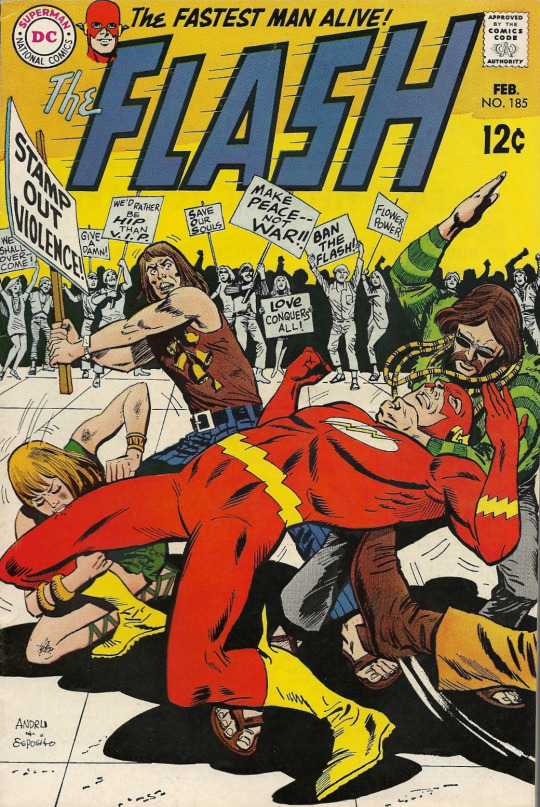
Negatives:
Flash #180-181. The Flash visits Japan. Incredibly painful stereotypes abound. And, on a less painful but still cringeworthy note, so does bad slang. Just skip it. You'll be much happier for it.
Flash #184 is his only good story for the Flash. Admittedly, he didn't write that many...but still.
Mike Friedrich
Fleshed out Barry's personality a little more. Namely, he established that Barry is afraid of roller coasters, and wrote a hilarious story where Barry plays every role in Hamlet at once after the rest of the cast gets sick (I'm partial to this one because I love Shakespeare).
Wrote a really solid Professor Zoom the Reverse-Flash story called "Time Times Three Equals----?", in which Sargon the Sorcerer tricks Eobard into thinking the Flash is dead for convoluted mystical reasons, and Eobard promptly takes off on a round-the-world and through-time crime spree. It's actually kind of awesome.
Negatives:
I can't think of anything off of the top of my head, other than the fact that his stories don't really stand out to me. With the exception of the Professor Zoom story, he didn't really get the chance to use any of the major Flash villains. So he's not bad, he just didn't write enough to really make an impact on me as a Flash writer.
Cary Bates
Positives:
Arguably the first true fan-writer. He grew up reading the Silver Age Flash, and he clearly loved and knew a lot about the characters. Fanboy writers don't always work out, but in this case, Bates' knowledge of the characters helped him write them really well, and flesh out most of the character well beyond what personalities they had had up to that point.
Wrote a very solid Barry/Iris marriage. They felt like a real couple, with real arguments and disagreements, but they also clearly loved each other and relied upon each other to get things done.
Used the supporting cast well. In addition to ensuring that Dexter Myles, Paul Gambi, Daphne Dean, and Barry's parents continued to make appearances, he also added many new supporting cast members, including Stacy Conwell, a college student who boarded with Barry and Iris for awhile, Barney Sands, Barry's 12-year-old neighbor who was just as big a fan of comics as Barry himself, Patty Spivot, Barry's fellow police scientist, Frank Curtis, an undercover detective who became friends with Barry, and, after Iris' death, Barry's neighbors Mack and Troy Nathan (Mack was a scientist at S.T.A.R. labs), Police Chief Darryl Frye, and Barry's almost-second wife, Fiona Webb. Bates did a really good job a creating a full supporting cast for Barry and Iris, and it helped make the world seem more inhabited.
Bringing back the Rogues. As Broome and Fox had retired, the Rogues had started being pushed to the wayside before Cary Bates brought them back into the spotlight---and then gave them some of their best stories ever. For a few of the Rogues, he's still the best writer they've ever had. Also, while the Rogues had technically become a team under Broome's pen, it was Bates who really solidified them as friends, rather than just the Flash's Secret Six. He had them have conventions together, attend funerals for each other, bail each other out of trouble, and fight the Flash together. They still operated independently sometimes (a fact most modern writers neglect to have them do), but they were now inextricably linked with one another in a way no other team of comic villains ever would be. I also really like the dynamic Bates' Barry has with the Rogues. It's this sort of bemused, mildly impressed frustration that's just great.
Introducing the Golden Glider. Cary Bates created what was, for the time, a downright terrifying villain in the Golden Glider, and, in doing so, subverted (probably inadvertently) a lot of the tropes that tend to accrue to female villains. She was meaner, smarter, and more ruthless than all of the male Rogues, and it's a bit of a refreshing change of pace to see a woman seeking revenge for the death of her boyfriend rather than the other way around. She was also one of the first Flash villains, and the very first Rogue, to uncover the Flash's secret identity. In spite of this, however, she was still quite feminine in a lot of ways, being very beautiful, quite flirtatious, and fond of jewelry. It's a unique combination of traits that you don't often see even today, and it's a bit sad that Cary Bates remains the best writer the character has ever had.
Creating other new villains. Besides the Golden Glider, Bates also created Rainbow Raider, whom I adore, the Clown, Colonel Computron, Clive Yorkin, and the Eradicator, the last two of whom are actually very effective and scary in their respective story arcs.
The Top is alive and well in Henry Allen! It's the best Top story ever written, and I love it.
Able to write both very serious and very humorous stories. Cary Bates was totally nuts sometimes, but he definitely had range in terms of tone, and could write humorous stories and very dark stories with equal effectiveness.
Negatives:
I'm honestly not sure whether this is really a negative or not, since I find the story to be kind of hilarious, but there is this one issue early in Cary Bates' run where he literally writes himself into the comic and has himself help the Flash defeat the Trickster. (We also learn from this issue that in the Bronze Age, Central City was located where Athens, Ohio is in the real world. Perhaps unsurprisingly, Cary Bates is an alumni from Ohio University in Athens.)
"Joe Scudder and Roscoe Neyle". Cary Bates was awful at remembering characters' names. He called Mirror Master both "Sam Scudder" and "Joe Scudder" in multiple separate issues, called the Top "Roscoe Neyle" once, called Patty Spivot "Pam Spivot" a few times, changed Albert Desmond's father's first name from Peter to either Herbert or Herman, called the Pied Piper's mom, Mrs. Rathaway, both "Rachel Rathaway" and "Hazel Rathaway" (within the span of like three panels!), combined the Pied Piper's real name (Hartley Rathaway) with his alias name (Henry Darrow) a few times, gave Barry's dad Henry a new first name at least once, and called the Reverse Flash "Eobard Thayne", "Eobard Thawnye", and "Professor Adrian Zoom". And there are probably more examples I can't remember. This is really only a minor gripe, and it is fun to play the "let's see whose name Bates messes up in this issue" game, but still...Bates forgot a ton of names.
A few too many supernatural shenanigans. Cary Bates was really interested in the paranormal when he was writing his run on the Flash, and while it often led to good stories (like the Top ghost story and the story that introduced Alvin Desmond), I feel like he still fell back on the paranormal a few too many times. The best example of this is the psychic girl, Melanie, who was in the "Death of Iris Allen" arc and just felt out-of-place in it, but it popped up a few other places as well.
Fiona Webb. Fiona Webb was introduced as the Flash's new love interest after Iris' death, and her story was basically one giant trauma conga line. She wasn't a terrible character (she wasn't annoying and seemed nice enough), but her relationship with Barry didn't get enough time to develop organically, and it felt like they got engaged far too quickly. Maybe it would have been better if they had continued dating for awhile, first, even if it meant delaying Eobard's dramatic attempt to murder Fiona at her wedding. I am, however, at least relieved that she ended the first Flash run fully recovered from her mental breakdown. It would've been pretty unpleasant if he'd just had her have a breakdown and then never spoken of her again.
Big Sir: While I'm glad the story goes out of its way to establish that he's a good person whose disability and mental problems don't make him evil (he has to be manipulated by the Rogues into fighting the Flash), this character was handled very poorly for the most part. He was also part of the broader...
Trial of the Flash Arc: There are a lot of good individual stories during this arc (the last four issues in particular are great), but as a whole, it just drags on for way too long. It's not entirely Cary Bates' fault, since he was in the middle of the arc when he found out that the book was getting cancelled, and his only two options were to end the arc as he had planned and try to wrap up the entire series with a truncated new storyline, or to drag out the trial plotline until the series ended. However, that doesn't change the fact that the trial quickly becomes the least interesting part of the actual Trial storyline, or the fact that this story lasted for something like a year and a half in real-world time---which I guess does make it the most accurate fictional representation of a trial in terms of the length of time it took to get to the trial. Aside from its length, however, the courtroom drama is both unrealistic and not especially exciting (the looming threat of the Flash going to prison for murder is exciting, but the legal drama is not, in part because the prosecution lawyer isn't very interesting). Also not helping things is the fact that by the time the Trial arc began, Cary Bates was editing himself. Thus, there was no one around to help steer him and the story in a less drawn-out direction. It's just a big, padded, drawn-out mess of a storyline---though I am thankful that it at least had a really solid, satisfying ending.
Mike Baron
Positives:
His first issue, where Wally runs a heart across the country to a patient who needs it for an operation, is excellent.
Baron writes a good Vandal Savage.
Wally is instantly memorable as a character. He's not necessarily likeable for most of Baron's run (more on that later), but he does at least stand out in your mind.
Introducing the Chunk (a living black hole who became Wally's friend) and Kilg%re (a living computer program). Both of them were fun characters.
Negatives:
Baron's Wally is a real jerk most of the time. He's overbearing, he's arrogant. he's obnoxious, and he's frankly kind of sexist at points. It makes him a little hard to read sometimes.
Wally's parents are humongous jerks. I actually don't mind the Wests being abusive parents (especially since we really didn't see that much of them Pre-Crisis, and we know that Wally has a lot of problems with Impostor Syndrome and depression), but they were very prominent in this run, and neither of them were likable---or scary/intimidating/cool---enough for you to want them to get as much page time as they did.
In fact, almost no one in Baron's run is particularly likable most of the time. It makes for an unpleasant read.
Wally having an affair with a married woman who's got to be at least ten years his senior is...uncomfortable. Mainly because I'm not sure that Baron thought this was a bad thing or not. Messner-Loebs writes it as a mistake on both characters' parts, but I don't know if Baron thought it was, too.
William Messner-Loebs:
Positives
Messner-Loebs made it clear that the reason Wally was acting like a jerk was because he was suffering from depression and impostor syndrome, not because he was shallow or selfish. He also dialed the sexism waaaay back (thankfully) and had Wally develop out of his jerk tendencies over time and learn to become a better hero.
Messner-Loebs also introduced a bunch of great supporting cast members for Wally. He brought back Joan Garrick, made frequent use of Chunk, reintroduced the Pied Piper as a reformed champion of the downtrodden, had Tina McGee and her husband reunite with one another and become friends with Wally, and introduced Mason Tollbridge, an old jack-of-all-trades who helped Wally out from time to time, and Connie Noleski, whom Wally dated for awhile. An at-the-time-reformed Captain Cold, Golden Glider, and Heat Wave rounded out the cast. Most importantly, though, he introduced Linda Park, a no-nonsense TV reporter who would help Wally grow up and who would eventually become his wife.
Flash #19. The whole thing. Wally partying with the Rogues (after the Trickster invites him to their party as a gag) is one of the best comics ever written. It's hilarious from start to end.
"No One Dies" is one of the greatest Flash stories ever. It's so good.
Tackling social issues well. Messner-Loebs' run is one of the few comics I've seen handle mental illness with any grace (his story about postpartum psychosis is really good, and Wally actually goes to therapy!), and his handling of homelessness and the importance of helping people in need is very well done. Messner-Loebs seems to have a lot of compassion, and it's very cool to see it represented in his stories.
Hope. In Loebs' run, people---and situations---get better.
Negatives:
Mary West makes a few too many appearances. I get that she's supposed to be obnoxious, but....she's really obnoxious. Also, the plot where she falls in love with and marries a secret agent was confusing.
After her first appearance in Flash #19, Messner-Loebs begins to write the Golden Glider as though she's bordering on "comic book crazy" (i.e., erratically violent and somewhat unstable). It's at least somewhat restrained under his pen, but it's setting the groundwork for later writers to write her very poorly.
This one isn't really Messner-Loebs' fault, but his run does get interrupted by unnecessary crossovers several times, which have a tendency to disrupt his storylines and are generally not particularly well-written (likely because he didn't really want to write them in the first place). It's especially notable because most of his run is relative quiet and domestic.
Mark Waid:
Positives
Mark Waid knows his stuff. He is a fanboy writer, and it shows in his delightful references to older Flash stories (The Life Story of the Flash is a particularly good showcase of this fact).
Waid writes an excellent Wally. Wally goes through a ton of character growth and development over the course of his run, and I love the snarky sense of humor he has.
Linda Park and Pied Piper are both handled very well by Waid---especially Linda.
Waid writes a very solid relationship between Wally and Linda. Like Iris and Barry under Bates' pen, they have realistic arguments and disagreements, but also clearly love and support one another.
Waid's use of the Speedsters as a team works very well. Wally, Jay, Max, Bart, Johnny Quick, and Jesse Quick all play off of one another well, and all of them are likable. The idea of a Speedster lineage that spreads across all of time is also cool.
The Speedforce. It's so important to the mythos that I can't not include it, even if a lot of later writers misused it.
Waid properly introduced the second Mirror Master, Evan McCulloch into the Flash comics, and in Flash vol. 2 #105, no less!
I appreciate that Waid brought Iris back to the present from the future, since that made it easier to use her in stories and let Wally talk to his aunt more regularly.
Many of the stories have very high stakes, so there's usually a lot of excitement during Waid's run.
"The Return of Barry Allen" storyline is excellent. I think it's one of the three best Wally stories (the other two being Flash vol. 2 #19 and "No One Dies", the story where Wally throws himself out of a plane to save a falling stewardess).
Waid writes my favorite Trickster (James Jesse). I love the reformation arc he gives him, and his mischievous nature is a delight. He also introduced Mindy Hong and James' son, Billy Hong, both of whom sadly only appeared once.
Waid's Kadabra is effective, cool, and scary----most of the time (more on this later).
Even though he was never properly utilized---and I'm not sure he ever could be, given how overpowered he is--I liked Tony Gambi (aka Replicant) a whole lot. The idea of Paul Gambi having a nephew whom the Rogues treat as a surrogate son is adorable.
Savitar was a very threatening villain, and the idea of a speedster cult leader was interesting. His design was ugly as sin, but he was Waid's best original villain.
Negatives:
Too much Kadabra. I like Waid's Kadabra, but he shows up as the main antagonist of big story arcs on at least three separate occasions.
Wally and Linda got separated from one another a lot. It was impressive when Wally escaped the Speed Force to save Linda the first time, but after the third or fourth time he escaped something similarly unescapable to save her, it did get a little repetitive.
Many lackluster antagonists. It really says something that both the soulless Zombie Rogues and the stupid brown-haired Chillblaines were more interesting as characters than a lot of the villains Wally fought during Mark Waid's run. Like Razer. Or the Alchemist. Or those alien guys. Or those other alien guys.
Having Kobra be the main antagonists for the storyline that included vol. 2's 100th issue also seemed a bit strange. Why not have Grodd or some other pre-established Flash villain be the antagonist for such an important milestone? Admittedly, this one is a bit of nitpick.
Waid doesn't seem to know how to write McCulloch. In Flash vol. 2 #105, he writes him as being very violent and grim, and in all his other stories, he writes him like he's Sam with an accent.
"Barry Allen had a SECRET EVIL TWIN!!!!" I would've loved this plot if it had been established in the Silver Age, and tolerated it if it was from the Bronze Age. But this plot twist was written in 1999, and it's accompanied with this weird sense of grimdark gravitas that just makes the whole thing impossible to take seriously. It also doesn't help that "Cobalt Blue" is a terrible villain name, or that Cobalt Blue's biggest achievement is being the ancestor of two guys---Eobard Thawne and Inertia---who are way better villains than he is.
Everything about how he handled Lisa. Waid really seemed to have no idea how to write the Golden Glider. First, he leaned hard into Messner-Loebs' take on her and made her completely comic-book crazy, and then he pointlessly killed her off to make the blonde-haired Chillblaine look scary for an issue before killing him off too. It was such a pointless waste of her character.
The Top. Weirdly enough, "Top possesses the body of a senator, becomes the running mate of a popular presidential candidate, and plots to use his position to eventually eliminate his running mate and become the President himself" sounds like an amazing Top story on paper....but in practice, Roscoe just feels off for the entire storyline. He doesn't really act like himself, and, as if that wasn't annoying enough, Wally and James both act like there's no way Roscoe could come back to life or be a threat. Even though he tried to blow up half the world, tried to blow up all of Central City, and once came back to life by possessing the body of Barry's dad. Why are they acting like he was a harmless joke?! Trickster worked with Top on a regular basis and was there when the Top posthumously revealed his "I'm going to blow up Central City" plan! They should not be so casual about this!
In fact, except for Trickster and Pied Piper, Waid didn't seem to know what to do with any of the Rogues. He killed them off in Underworld Unleashed, and, while he had the good grace to admit that was a bad idea and bring them back to life a year or so later, he still didn't seem to know what to do with them. For some reason, he was convinced that there was no way to write them seriously (even though he didn't have the same problem with Trickster or Kadabra).
I wasn't a fan of the way Waid discarded so much of Messner-Loebs' supporting cast. A lot of those characters were interesting, and it's a bit sad to just see most of them discarded in favor of the new cast of mostly speedsters (even though, as mentioned, I do like the speedsters).
Grant Morrison and Mark Millar---Obviously, they're two separate writers, but their year-long run was a team effort, so I'm talking about them together.
Positives:
Grant Morrison's "The Suit" and "The Human Race" are both totally bonkers, but in the best possible way. I'm particularly fond of how much "The Suit" feels like a Silver Age issue.
Similarly, the story about Jay Garrick is heartwarming and sweet. Morrison does a really good job writing Jay.
Morrison gets to write Evan McCulloch, which is always a delight. No other writer ever quite manages to capture the magic of Morrison's McCulloch and his perfect Glasgee burr.
The Black Flash is a really cool concept.
Negatives:
The Black Flash storyline, unfortunately, is kind of a confusing, disjointed mess. It's really hard to follow what's supposed to be happening.
The "Three of a Kind" storyline, which features Heat Wave, the Green Lantern villain Sonar, and some guy I've never heard of named Hatchet sinking a cruise ship and killing a bunch of people in an attempt to revive Dr. Polaris for some reason, is terrible. Mick is very out-of-character here. He's usually not nearly so violent. Even setting that aside....how and why did he start working with Sonar and Hatchet? He's never worked with them before. And why did they want to revive Dr. Polaris? I know they said they needed a leader, but why did it need to be him? Why not just go find Lex Luthor or somebody? I'm sure Lex Luthor wouldn't turn down three guys with high-tech guns. And joining him wouldn't have required them to sneak Dr. Polaris' comatose body onto a cruise ship and then forcibly take said ship to the Arctic Circle. Ugh, so many questions...
Geoff Johns
Positive:
Geoff Johns does a really good job of making the Twin Cities feel distinct from the rest of the DCU.
Geoff Johns also does a really good job writing the Rogues. He fleshes them out and gives several of them detailed backstories; he's also the one who created Captain Cold's Rules and the one who really brought the team back to prominence. He also really amped up Weather Wizard's powers.
Johns introduced a lot of cool new villains, including the new Trickster (Axel Walker), Captain Boomerang Jr. (Owen Mercer), Peek-a-Boo, Fallout, Double Down, Murmur, Girder, Plunder, Blacksmith, Tar Pit, and Cicada. I like some of these characters more than others, but all of them have a definite narrative purpose, none of them are completely boring, and they expand the Flash's villainous roster in a good way.
Officer Chyre and Detective Morillo are great supporting characters for Wally. I love their odd couple partnership.
It's cool to see Cyborg in the Twin Cities and helping Wally in the first half of the run.
Warden Wolfe and Iron Heights Penitentiary are good additions to the mythos. Wolfe is a great antagonist in that you really want to see him taken down a peg.
Wally and Linda's relationship continues to be solidly written.
I liked the way Geoff Johns established Hunter Zolomon as a supporting character, then gradually turned him into Zoom through a series of tragedies, mental problems, and bad choices. It made for a very effective---and scary ---antagonist.
Wally's twins are born (after an initial miscarriage). Jai and Irey are adorable and I love them.
The idea of Iris Allen raising Weather Wizard's baby son is adorable. In fact, Weather Wizard having a baby in general is a hilarious idea that a more comedically-inclined writer could have used to great effect. But instead....well...more on that later.
Wally continues his character development.
Negatives:
While I actually enjoy Johns' "Wonderland" arc, I also think it's weird and confusing in a lot of places, and it's doubly weird that he later retcons about a quarter of what he establishes here.
Johns' Magenta felt slightly off. Not so much so that she was totally out of character, but I've never felt like Johns quite had a grasp on what she's supposed to be like.
Pied Piper's trauma conga line was....a bit much. Granted, not all of his suffering was Johns' fault (Flash: the Fastest Man Alive and Countdown, I am looking at you), but it was still a lot, and it seemed almost like Johns wanted to break up his friendship with Wally by putting Piper through said conga line.
James Jesse...FBI agent. Another concept that sounds amazing on paper, but was executed very clumsily. The issue with FBI James isn't that he's with the FBI...it's that he suddenly starts acting like a self-serious bureaucrat for no apparent reason. And that he's dumb (and cold) enough to think that making a zombie Captain Boomerang via corpse desecration is a good way to defeat the Rogues. It just doesn't seem to mesh with what we know of James...and that's not even going into the retcons....
Backstory Retcons. Geoff Johns likes retcons. He really, really likes retcons. And he especially seems to like retcons that involve adding murder into the Rogues' early history for some reason. Like how Mark killed his brother (albeit by accident). And how Digger killed his stepdad at his mom's funeral. And how Sam Scudder apparently killed some random person during a burglary before he became the Mirror Master. And how the Top apparently killed more than eleven police officers during the Bronze Age. And how Mick Rory burned his family, another kid's family, and everyone in the circus he worked in alive in fires (this one's not technically a retcon, since strictly speaking it doesn't contradict anything that we already know, but it definitely doesn't mesh smoothly with Mick's origin as it was presented in the Bronze Age). And how Evan McCulloch shot his father (without realizing that it was his father), which caused his mother to commit suicide (again, not really a retcon, but included for completion's sake). Sometimes I worry about Johns....
Roscoe's Mind Control. And then there was the Mother of All Grimdark Retcons, in which we learned that Barry Allen had had the Top brainwashed into being a good guy, that the process had driven him insane, and that he had then attacked the other Rogues and tried to brainwash them into becoming good guys too. Wally has Zatanna lift Roscoe's brainwashing, which makes him sane again, and shortly thereafter he lifts his own brainwashing on James, Mick, and Piper (though Piper manages to stay good through Wally's help). All that character development Mick, Piper, and James have had? Forget that, it was all just Roscoe's mind control! Even though Roscoe never had mind-controlling powers before this story. And even though the way this timeline works, Roscoe would had to have been brainwashed, go crazy, brainwash his friends, commit ghost suicide by exiting his host body, somehow become sane and escape the influence of Zatanna's mind control, return to life by possessing the body of Senator Thomas O'Neil, almost become the president, get attacked by the soulless zombie Rogues, go crazy again, and then somehow fall back under the influence of Zatanna's mind control (because she can't have removed it if it was no longer there). That makes no sense. And that's not even going into the fact that, while you're looking at the timeline of events, only Mick actually reformed around the time that Roscoe possessed Barry's dad. All the other Rogues didn't even start flirting with reformation until after Barry was dead. It's one of those retcons that kind of makes sense on the surface, but makes less and less sense the more you think about it.
Posthumously Fridging the Golden Glider. I really love Captain Cold's spotlight issue. It's a great story for him. The problem is that Lisa's function in the story (the dead little sister he's sad about) is the only role Johns seems interested in having Lisa play. He thinks she's more important to be dead so Len can angst than alive to actually---y'know---be a character. Also, he seriously downplays her romance with the Top, as well as how fiery and mean she could be.
Everybody hates Roscoe, apparently. Johns doesn't much care for Roscoe. That's fine. Everyone has characters they don't like. The problem is that Johns deliberately writes the character to justify his dislike of him, and then has him killed off. Now, to be fair to Johns, Roscoe is indeed a jerk. The problem with Johns' Roscoe isn't that he's a villainous jerk----it's the fact that he's treated as uniquely separate from, and worse than, all the other Rogues. It's also implied that the Rogues never much liked him, but they all seemed to get along with him fine back in the Silver and Bronze Ages (with the apparent exception of Len, who was probably already bitter about Roscoe dating his sister---and even Len didn't hate him in the way that he does under Johns). Also, Roscoe really isn't that much nastier than Evan, or even Mark, and both of them are Rogues in apparent good standing. And, while I actually like the idea that Roscoe is something of an elitist and likes literature and classical music and fine wine, it's a bit odd for Johns to add that to the character, treat it like it was always a part of his character, and then have Len kill him for it. Basically, the issue isn't that he's a jerk....it's the fact that he's at odds with the other Rogues in a way that he never was shown to be before (the only exception was when he died and tried to blow up the city out of revenge/spite, and even then we saw them remembering him with some fondness after his death---toasting him, naming a anti-Flash device after him, etc.).
Needless grimdark deaths of important supporting characters. There are many examples, but the worst ones were, roughly in order of increasing horribleness, Blacksmith shoving a painting into Rainbow Raider's chest and killing him, the whole Captain Boomerang subplot of Blackest Night: the Flash, and having Inertia kill Weather Wizard's infant son.
In speaking of the horrible Blackest Night Captain Boomerang subplot....having Owen suddenly decide that he's A-OK with killing women and small children and feeding them to his zombie dad (I just realized that Johns wrote two different plots featuring a zombie Digger. That's a bit weird). Prior to this point, he had pretty much become one of the good guys, so this sudden shift into horrible evil just came out of nowhere and made no sense.
Captain Cold: Spotlight Thief. So, Geoff Johns really, really, really likes Len, and he writes him well (for the most part). The problem is, this means that he has a bad habit of focusing on Cold at the expense of the other Rogues, and that he sometimes writes Cold as though he's the only Rogue capable of being intelligent or competent (Flash: Blackest Night is probably the worst in this regard, but it shows up elsewhere in his comics too). It gets a little frustrating after awhile, no matter how great Johns' Len is. Worse, this habit of Johns of writing Len as the most important Rogue would eventually lead to other writers focusing on Len even more, and to them treating the other Rogues like they're Len's henchmen instead of his teammates. It's all very frustrating.
15 notes
·
View notes
Text
For anyone who's curious:
Issue #207 was written by Mike Friedrich, who was one of three or four writers who wrote for the title after John Broome and Gardner Fox were entering retirement, but before Cary Bates took over the book for over a decade.
Issue #306, weirdly enough, was actually a fill-in issue by Dan Mishkin and Gary Cohn. Perhaps surprisingly, it's actually a really good issue, and it fits Cary Bates' tone so perfectly that I thought he was the writer until I happened to check the credits for it.
Fiona really had a rough go of it. First she was almost killed by her evil ex-boss (who coincidentally looked exactly like Barry Allen), then Senator Creed Phillips, her boyfriend, turned out to be a murderous superpowered vigilante who called himself the Eradicator, who kidnapped her and then ultimately ended up killing himself, then she got engaged to Barry only for him to (from her perspective) stand her up at the altar, then she was almost killed by Professor Zoom the Reverse-Flash, then she saw the Flash kill the Reverse-Flash right in front of her, then her fiancé dropped off the face of the Earth (Barry faked his own disappearance after getting arrested for killing Reverse-Flash....as the Flash), then she had a nervous breakdown and had to be hospitalized, then when had she almost recovered events transpired that led to her having a relapse, and then when she was finally fully recovered, Barry basically immediately disappeared to go live in the future with the not-dead-after-all Iris. And then Crisis on Infinite Earths happened, and Fiona was basically never mentioned again. Poor Fiona.
Also, Barry's parents seemed to treat her like an also-ran. Particularly Henry. They didn't actively oppose Barry's marriage to her, but there was this really uncomfortable undertone of "She'll never be as good as Iris". It also didn't help that Henry's reaction to her being upset that his son had stood her up at the altar was to basically tell her "Well, if you REALLY love him, you should just stand here and wait for him to show up even though it absolutely looks like he stood you up for no reason". Charming, Henry:
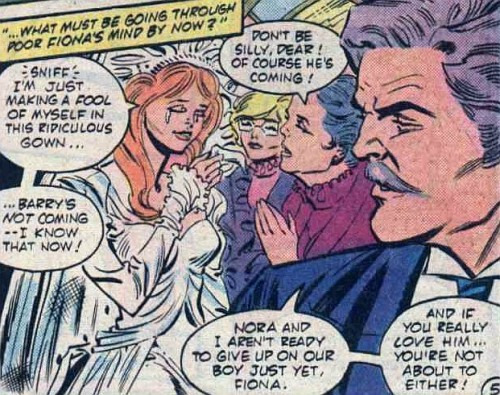
No wonder Barry got along with Roscoe's-ghost-pretending-to-be-you better than he got along with you:
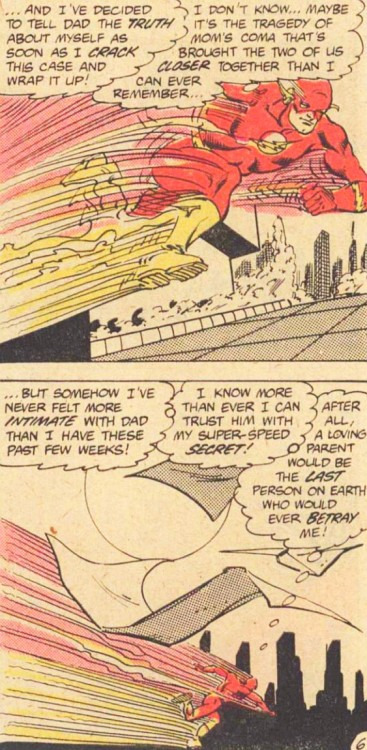
Note that Barry also never told Fiona that he was the Flash, so it's not like she knew that he might have disappeared for Flash-related reasons. You'd think he'd have learned after Iris that having your spouse in on your secret is helpful, but apparently not!
Interestingly, the psychiatric hospital where Fiona was staying also housed the Pied Piper after he had a mental breakdown in the same arc:
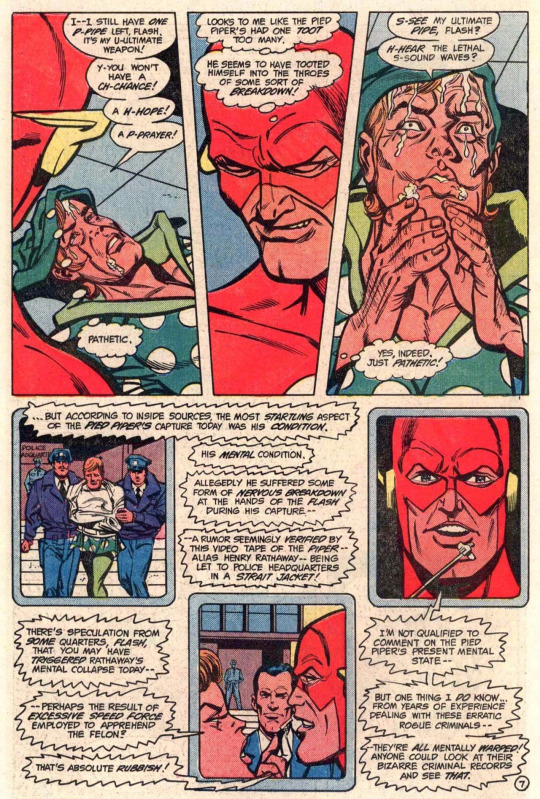

He's called "Henry Rathaway" because Cary Bates forgot a character's name again. Here, he combined part of Piper's alias name (Henry Darrow) with part of his actual name (Hartley Rathaway).
Also, I don't agree at all with Barry/Cary Bates' analysis of the Rogues as being "mentally warped", at least not in the sense that they're driven to villainy by mental illness. I think Bates kind of jumped on the Batman villain train a bit towards the end of his run insofar as he started to imply that all the costumed villains had to be mentally ill, but thankfully, he did at least avoid sending any of the Rogues besides Hartley (who legitimately DID have a mental breakdown and legitimately did need treatment) to a psychiatric facility.
That being said, the progress of Piper's mental breakdown (and Fiona's own breakdown, for that matter) were actually handled surprisingly well, especially for the 1980s. We got to see the Pied Piper slowly deteriorate over the course of several issues before he finally had his breakdown, and both he and Fiona were shown to have their symptoms improve, to relapse, and then to finally recover. This implies that, in a rarity for comic books, Central City has psychologists that can actually do their jobs (and aren't evil!) The hospital is also called a hospital and not an asylum, which is a relief, and Fiona's mental illness was not used to villainize her in any way, which was a refreshing change of pace. There are still quite a few flaws in the way the story handles mental illness, of course, but it's kind of embarrassing that a story from 1984-1985 is better at handling mental health issues than most modern comics (Heroes in Crisis, I am looking at you and your unfortunate implication that even heroes with mental health problems are potential murderers and that going to therapy will make your problems worse and get you killed.)
The two police officers talking to the receptionist aren't police officers at all---they're actually Captain Boomerang and Mirror Master in disguise, and have arrived to break Piper out of the hospital (not yet knowing how bad his mental state actually is).
On an unrelated note, Flash #307 also featured disco-dancing Sam:

In this same story, he also fell in love with a woman named Narcissa, who was from of one of DC's 5 different Atlantises and had become trapped in the mirror whilst attempting to escape the destruction of her city. Sam tried to free her by tricking the Flash into swapping places with her, but this ended up breaking the mirror and trapping Narcissa inside permanently:
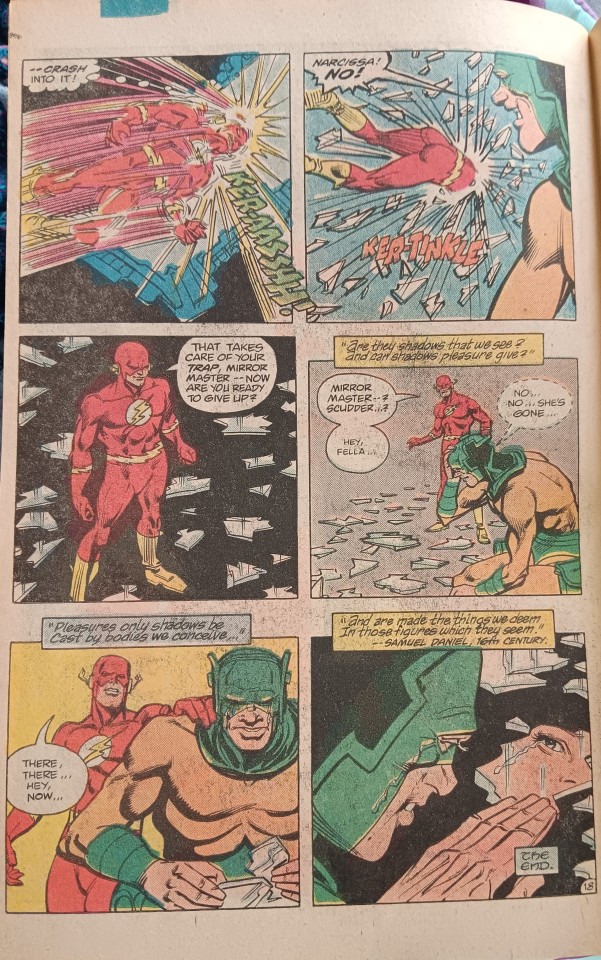
I love how Barry goes from "Nice try, Mirror Master, but I've defeated you again" to "Mirror Master? Hello, Mirror Master? Scudder?" to "there, there, buddy. It'll be all right" in the span of about a minute. It's a nice showcase of Barry's compassion, even to his enemies.
This is also probably the only classic Sam comic where he's portrayed in a sympathetic/tragic light, and one of only a few times where we see him feeling truly vulnerable.
The first of the other two examples was the time he went to Gotham City to steal a necklace and quickly became embroiled in a "who's the better criminal fight" with Digger, who was also in Gotham trying to steal the same necklace. Apparently, Sam is just petrified of Gotham generally, because this is his initial reaction to thinking he's about to get mugged by some thugs:

He really does seem terrified---and it's not because of the Batman or the Joker or anything, it's because of regular thugs in cheap party masks. Sam must be really scared of Gotham.
He's called Joe Scudder here because Cary Bates was really bad at remembering character's names.
The last example of Sam actually being vulnerable came from Flash #320, where he was nearly killed by the Eradicator (the same one who was the senator Fiona was dating):
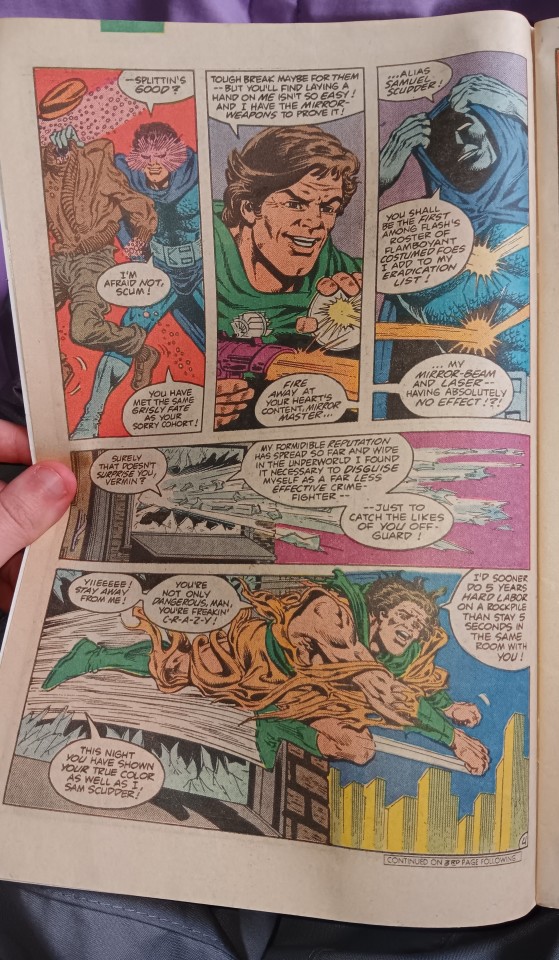
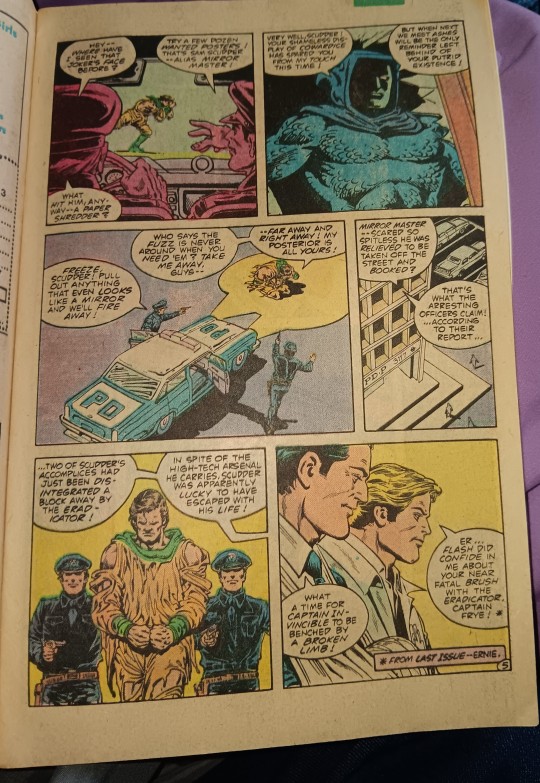
Most of the rest of the time he was confident and cocky, so these three instances really stand out.
Unlike poor Fiona, apparently, since basically everyone's forgotten about her. I wish somebody would bring her back sometime, just to show that she's now happily living a life of her own somewhere, having fully recovered from all that trauma.
Something something Barry saying he won't dance when he's out with Fiona cause he thinks he's bad at it
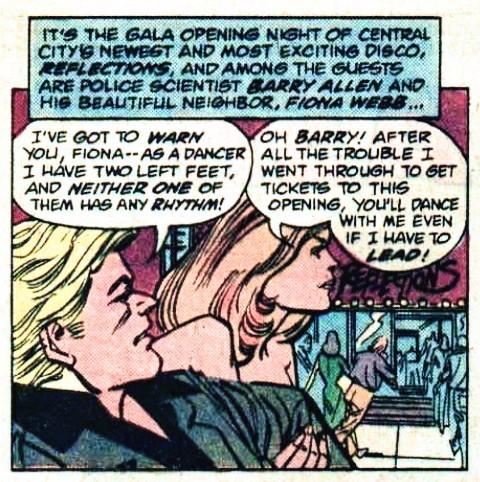
(Flash 306)
VS
Barry grooving at home, getting ready to go out and being so comfortable with Iris that he can't help but dance
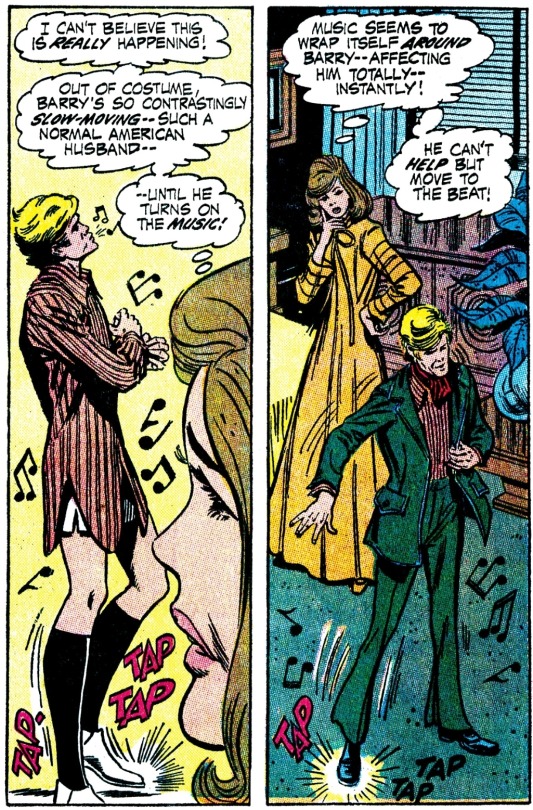
(Flash 207)
Did the author change and just forget about this? Yes and probably. But, can i read too far into it watsonian-style? Also yes.
#flash comics#flash rogues#the flash#barry allen#fiona webb#mirror master#sam scudder#dr. henry allen#nora allen#bronze age comics
47 notes
·
View notes
Text
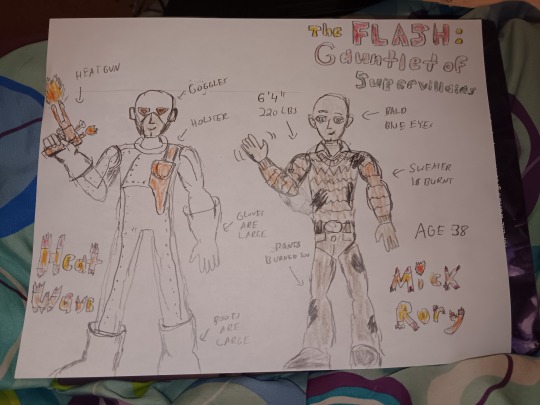

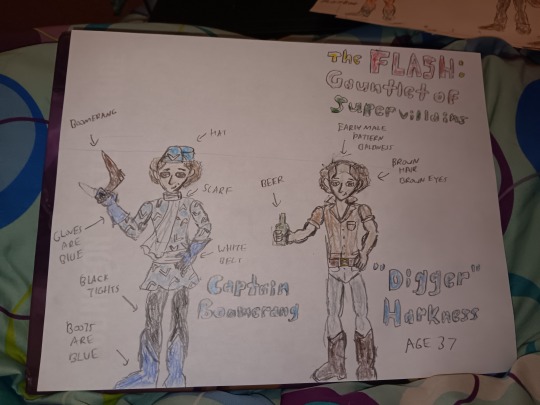
And the last batch of character models.
Heat Wave's original costume is shapeless and sorely lacking in color. It's so overwhelmingly white. Also, it's made of asbestos. So if you were wondering why Mick got cancer in Jeremy Adams' Flash run (don't worry, he got better), that's why.
Sam's shades come from Flash vol. 1 #242. I also gave him a wide 70s tie, because why not?
I finally figured out how to draw Digger holding a boomerang in a way that looks good!
#flash comics#flash rogues#mirror master#sam scudder#captain boomerang#george digger harknesss#heat wave#fanart
14 notes
·
View notes
Text


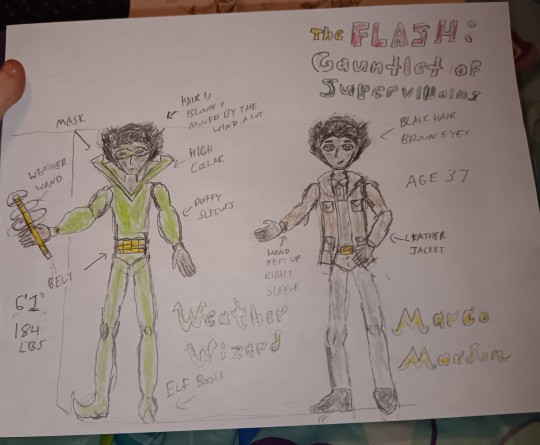
More character models.
70s-style James was very fun to draw. Remembering which of James' stripes are what colors was less fun.
As was classic elf-style Pied Piper. The reason he's being called "Henry Darrow" rather than "Hartley Rathaway" is because the Rathaways' secret hasn't gotten out yet. Henry Darrow is the alias his parents paid the FBI to give him so that no one would connect the Pied Piper to them (as we learned in Flash vol. 1 #307).
The unifying factor between these three is that all of them wear elf boots.
11 notes
·
View notes
Text
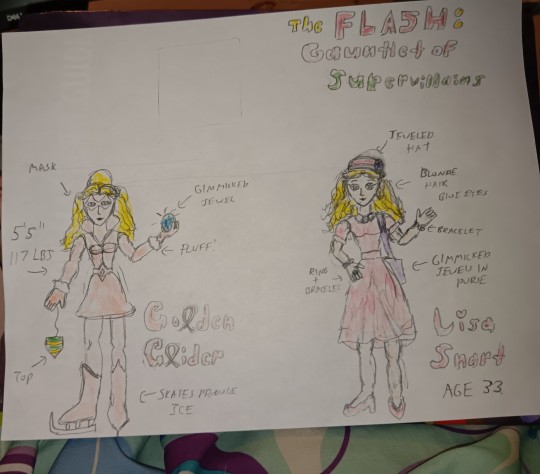
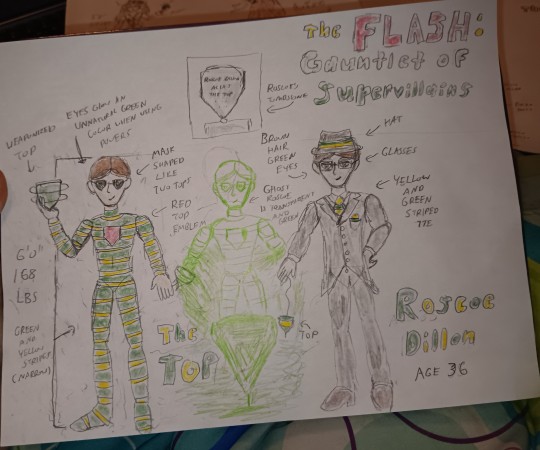
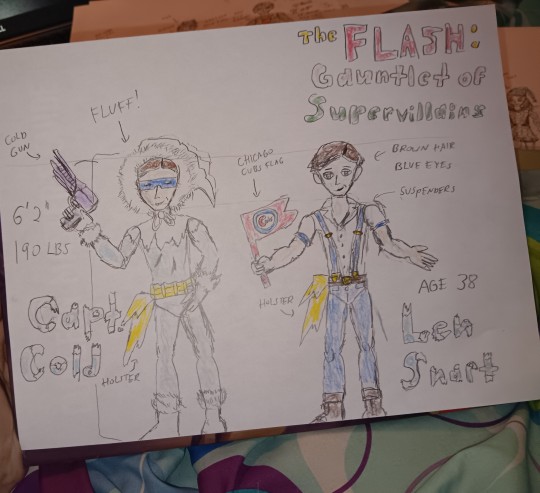
More character models.
You'll note that a lot of the Rogues' civilian clothes are a bit old-fashioned; this was deliberate. Since the plot of the game was based on Silver and Bronze Age comics, I gave a nod to that era by using civilian clothes from the 1950s through the 1980s.
Since the Combines didn't exist as a team until after Wally became Flash (and I mean in-universe, they were written to be a new team during Johns' run), we get Baseball Len instead of Hockey Len. He is canonically a fan of the Chicago Cubs, hence the flag.
You'll notice that Len is smiling; he actually did that sometimes during the Silver and Bronze Age. This is also before stress, hard living, and middle age hit him like a truck and he wound up looking 60 at 43.
And Len actually did wear suspenders like the ones he has here in his very first appearance, Showcase #8.
Counting Henry Allen, I drew the Top four times for this project.
5 notes
·
View notes
Text
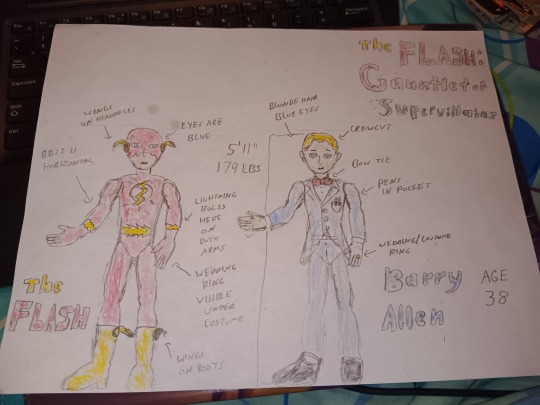

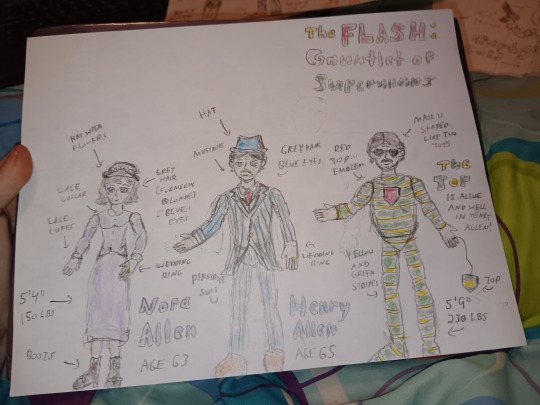
Awhile ago, I made two Flash video game proposals, one for Barry Allen and one for Wally West. I also drew character models for the Waly West game.
These are some of the character models for the Barry Allen game.
Barry and Iris are based on their Silver Age appearances.
I messed up on the coloring of Wally's Kid Flash outfit. Hopefully it's not too noticeable. His pants are supposed to be red, and his boots are supposed to be yellow, but I accidentally switched them around, then had to add a red lightning belt to break up the costume.
Also, the Top is alive and well in Henry Allen!
#flash comics#flash rogues#the flash#barry allen#wally west#kid flash#iris west#nora allen#dr. henry allen#the top#fanart
6 notes
·
View notes
Text
A Rant About Flash and Captain Boomerang in Suicide Squad: Kill the Justice League
This post will contain spoilers for Suicide Squad: Kill the Justice League under the cut.
So, I watched a video of the cutscenes of Suicide Squad: Kill the Justice League, and....well...let's just say that it frustrated me enough that I rage-quit watching part of the way through. (Usually, I don't rage-quit stories, because usually I don't hear about the stuff that would make me rage quit until after the story has been out for awhile, and so I don't get caught off-guard by it. This is one of the few times where a story managed to catch me off guard with a plot point I hated enough to make me quit.)
But I'll cover the non-spoilery Flash-related stuff (which did not make me rage quit) first:
-For the most part, the game pretty much nailed Captain Boomerang. He was an utter scumbag, but he was also really funny and more competent than you'd expect---so pretty much exactly what Digger is supposed to be.
-That being said, I think the game might have gone a little TOO far in making him a scumbag? Like, I know that's a part of his character, but after a certain point, he becomes a bit too unlikeable to be a main protagonist. It definitely doesn't help that positioning the Squad against the Justice League means that there isn't the mitigating factor of him fighting people who are even worse than he is.
Basically, if Digger has to fight---and win against--- the Justice League for plot reasons, maybe don't make him as awful as the nastiest versions of his comic book self? It makes him winning fights against heroes, mind-controlled or otherwise, VERY unpalatable.
-Also, he should have used boomerangs more and guns less. I know this is partially for gameplay purposes, but he's Captain Boomerang, not Captain Shotgun. He can use boomerangs to do anything---so why not lean into that?
-Between the super speed gauntlet and the fact that he has to win fights against the Justice League, I almost feel like Owen should have been this game's Captain Boomerang. Owen fighting the mind-controlled Justice League would be a lot more pleasant than maximum-jerkwad Digger fighting them---since, y'know, Owen is actually nice most of the time. He'd be a lot easier to root for.
-In spite of the fact that the game seemed to have a fairly good grasp on Digger, I can't say the same for its grasp on the Flash. I don't know why DC has been having so much trouble with adapting the Flash as of late, but it's getting very frustrating.
-More specifically, the game features the not-so-triumphant return of what I call Warry (the hybridized Flash that mixes elements of Barry and Wally together). He has Barry's name (and eye color), but he's hot-headed, brash, and impulsive, and the rest of the Justice League treats him like a rookie. In other words, his personality and relationship with the League are very reminiscent of Wally. This is a very, very, very longstanding issue of Flash adaptations, but I'm not thrilled to see it happen again.
-Although that's not really the worst part. The worst part is that this version of the Flash is just....really annoying. Like, more annoying than Wally at his worst. He honestly feels like Axel Walker cosplaying as the Flash. (Granted, part of that might be because he spends over half the game being all evil due to Brainiac's mind control, but even before that he seemed very, very young and somewhat obnoxious.)
-It also didn't help that I found the sound of his voice to be annoying. The performance itself was good, there was just something about the voice itself that rubbed me the wrong way. Digger had an abrasive voice, too, but he's supposed to be annoying and abrasive, so having an annoying voice made sense for him. Not so much for the Flash.
And then there was the thing that made me rage-quit the game (SPOILERS AHEAD):
And then the Suicide Squad killed the Flash. Like, for-real killed him. (I mean, I know that the game is called "Kill the Justice League"....but I didn't expect them to ACTUALLY kill the Justice League. I was assuming that it was hyperbole for the sake of a cool game title, especially since having the Justice League get killed would be really depressing. I am not happy to be proven wrong.)
And yes, I know that within the context of the game, killing the Flash is the only way to stop him, but it still feels like a total cop-out given how many superhero stories involve mind-control, and how many of those stories prove that there are a hundred other ways for characters to snap someone out of mind control.
And if for some reason the character HAD to die, it feels really mean-spirited to let maximum dirtbag Captain Boomerang be the one to do it. I love Captain Boomerang, but I have never wanted to see him kill the Flash. Because I like the Flash, and I like it when the good guys, y'know, win.
And that is why I rage quit watching Suicide Squad: Kill The Justice League.
#flash comics#flash rogues#suicide squad kill the justice league#captain boomerang#george digger harknesss#the flash#barry allen#but not really#Longitudinalwaveme rants about stuff
42 notes
·
View notes